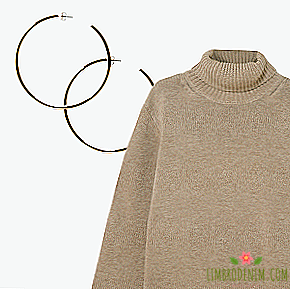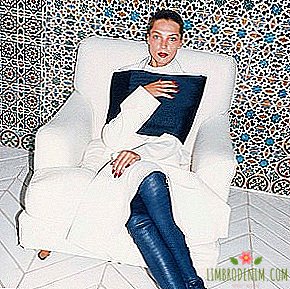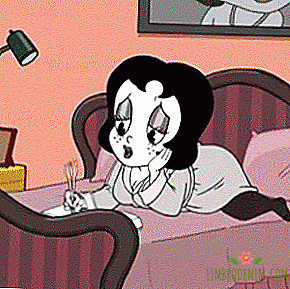Why natural makeup makes us hate ourselves
Text: Roxana Kiseleva
If literally a couple of years ago under the slogan of "natural beauty" we were selling an eyebrow set of three items, false mink eyelashes and another Naked palette, now the “natural make-up” discipline has become much simpler: we are offered the tonal foundations of the new generation with the most delicate coating in the entire history, and just leave it as is . Sources of inspiration are true, have not changed: with advertising posters still look goddess with perfect skin, sharp cheekbones and neat lips. While in life few of us wake up with combed eyebrows and a gentle blush, the "nude" category continues to insist that we are somehow obliged to create such an illusion day after day.
Now we are supposed to portray indifference in order to avoid the image of "unnecessarily trying"
Yesterday, when supplying clients with super-resistant eyebrow lipstick, marketers were in a certain sense more honest, “allowing” women to paint at least something on their face; now we are supposed to portray indifference in order to avoid the image of "unnecessarily trying." In the 1980s, the line of nude tools, invented for women who do not want to hide their real face, became a sales hit - and it was a small victory, the possibility of a new choice. But time has passed, and the modern "norm" of choice does not leave: the makeup should be light, transparent, smooth and completely invisible.
This carefully organized "negligence" is in many ways an imitation of the famous French non-chalance. The i-D recently published a column on fashion for "French girls", which we, it seems, did not take place. In the perception of the majority of Russians, a Parisian is a flirty marshmallow ad; and America, which gave the world the veneers and the instagram celebrity profession, is today crazy about the naturalness and ease of French women. If the recent insanity was the notorious "on fleek" (which roughly means "flawless") - eyebrows on fleek, arrows on fleek, lips on fleek, - now the Americans want the same thing, only "like a French girl". “French style” is no longer a story about fashion and beauty, but literally a lifestyle for sale - although, of course, these idealized images have little in common with reality.
In the field of the idea of "natural beauty" more than one brand has grown - the best means for creating the "ideal" type of skin has become famous, for example, Becca. The inspirers of Urban Decay, who presented the world with the famous Naked palettes (and in many respects the very idea of a “naked face”), can be called Ultima II with their series The New Nakeds. Positioned as a luxury branch of Revlon, the brand initially specialized in expensive care, and under Kevin Ekoan’s creative vision in the early eighties launched the line of the first “make-up without makeup”.
It was brown lipstick and tonal foundations with the most extensive range of shades, from alabaster to chocolate. Having successfully launched, the brand actually died before reaching the popularity of a similar Urban Decay line: either the Americans didn’t want to paint themselves “for themselves”, or the technical capabilities of that time did not allow the promises given to customers - Ultima II moved from expensive department stores to drag stores , and by the beginning of the 2000s, they settled in Asia at all. It is there that the idea of “natural beauty” is stronger today than ever: everyone is striving for a clearly outlined ideal, which is supposed to correspond.
Due to the fact that the foundation no longer looks like gouache, it is normal to look "more natural" than before.
Since the time when the make-up of Francois Nars with transparent skin was considered rebellious, much has changed. Including from the technical side: due to the fact that the foundation no longer looks like gouache, it is normal to look "more natural" than before. We have learned how to blend tonal resources into zero, masterly simulate both a winter blush and a California tan at the same time, but for some reason all this remains the foundation that is mandatory for everyone. If the whole point of natural makeup is implicated in the importance of self-love and the beauty of the soul instead of glorifying the beauty of the body, then why does it make everyone look equally unrealistic?
Once a similar story happened with the idea of "youth": marketers actively appeal to youth, apparently describing the early twenty as the best time in a woman's life. In fact, we look “great” to the first acne, that is, up to twelve years old, or even better - up to five. Many still remember what skin is in puberty: in press releases to life-giving masks, they are usually called "subject to constant stress." Unstable hormones, lack of interest in care, insomnia, wine diet - this is not the life of a single young girl, and all this leaves its mark. The beauty industry, however, offers us, with the help of cosmetics, to regain the “freshness of the peach”, which most of us did not have time to see and appreciate.
The rejection of cosmetics, or its careful imitation, was recently started up again: a wide resonance was caused by the inspired Alicia Keyes make-up tutorial on the YouTube channel of the American Voice. The catch is that the singer herself refused makeup and her own “fresh-faced look” fresh in the literal sense: you can hardly find even a transparent mascara for your singer's makeup bag. The usual nude is just another kind of makeup that sells well and whose promotion, as always, is implicated on our fears and complexes. Does your face look "not perfectly" unpainted? Apply this weightless tone, and blend the bronzer. A “faceless” face is just another unrealistic standard. So once again, spending a third of the morning at the mirror, portraying the "absence" of makeup on your face, you should think: do we really like it? Perhaps this time we would like to spend on something that tells about our individuality, and not fit it under the faceless average denominator.




